Unit 5 The power of nature warming up and reading
文档属性
| 名称 | Unit 5 The power of nature warming up and reading | 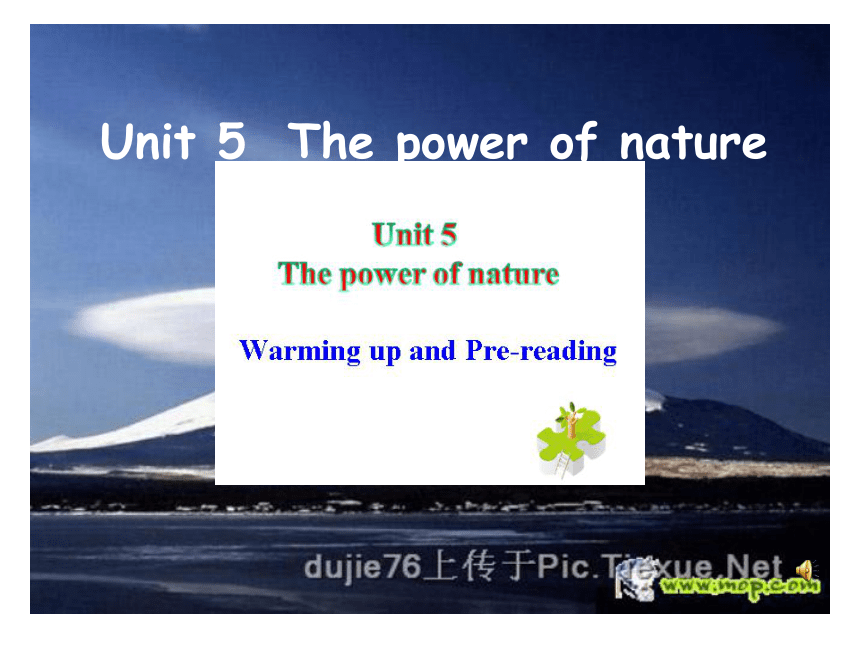 | |
| 格式 | rar | ||
| 文件大小 | 3.8MB | ||
| 资源类型 | 教案 | ||
| 版本资源 | 人教版(新课程标准) | ||
| 科目 | 英语 | ||
| 更新时间 | 2011-12-22 16:24:05 | ||
图片预览

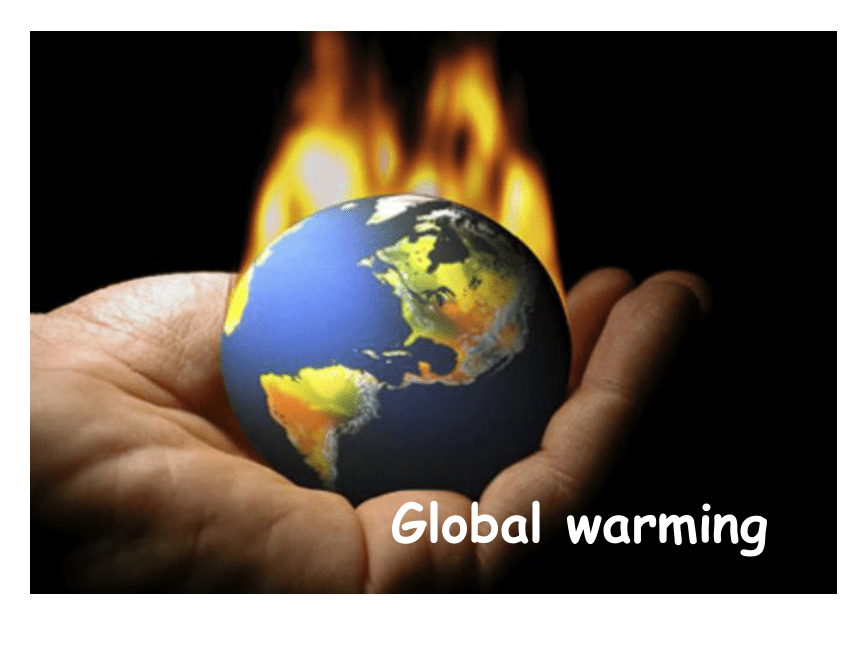
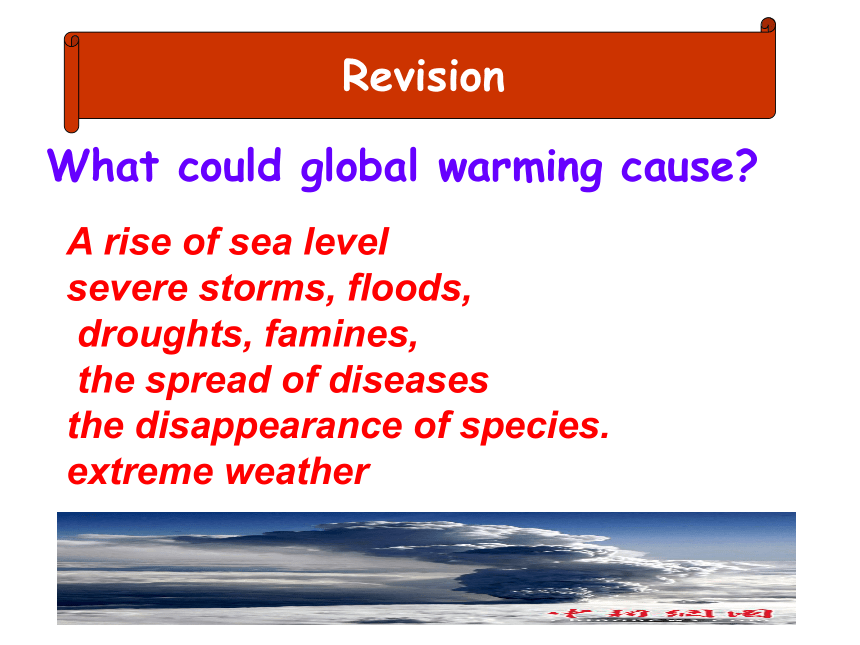
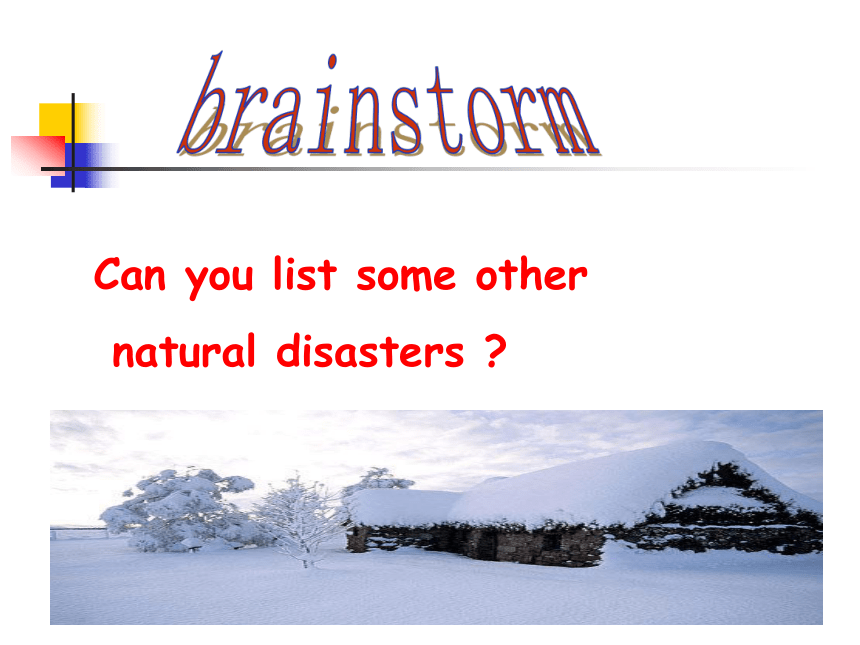
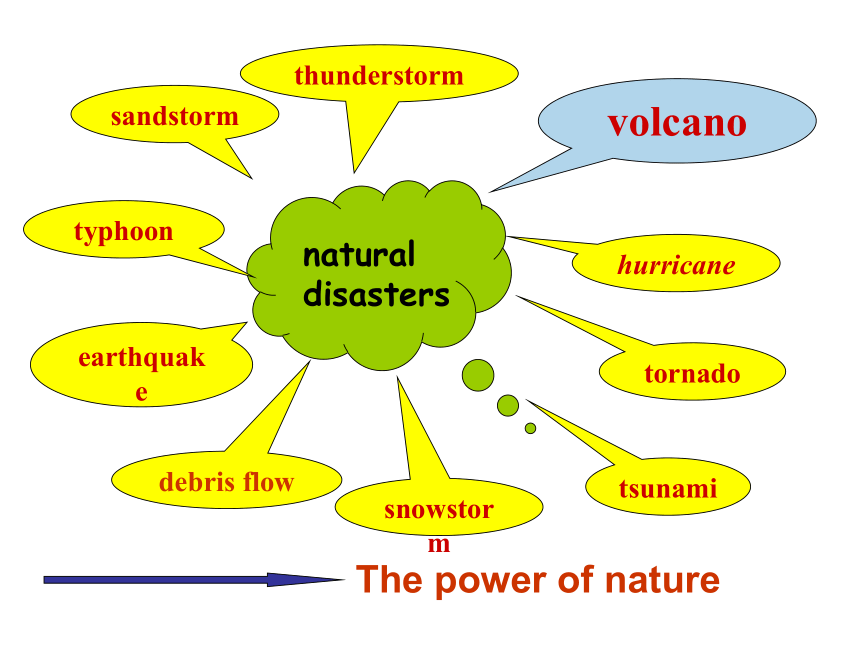
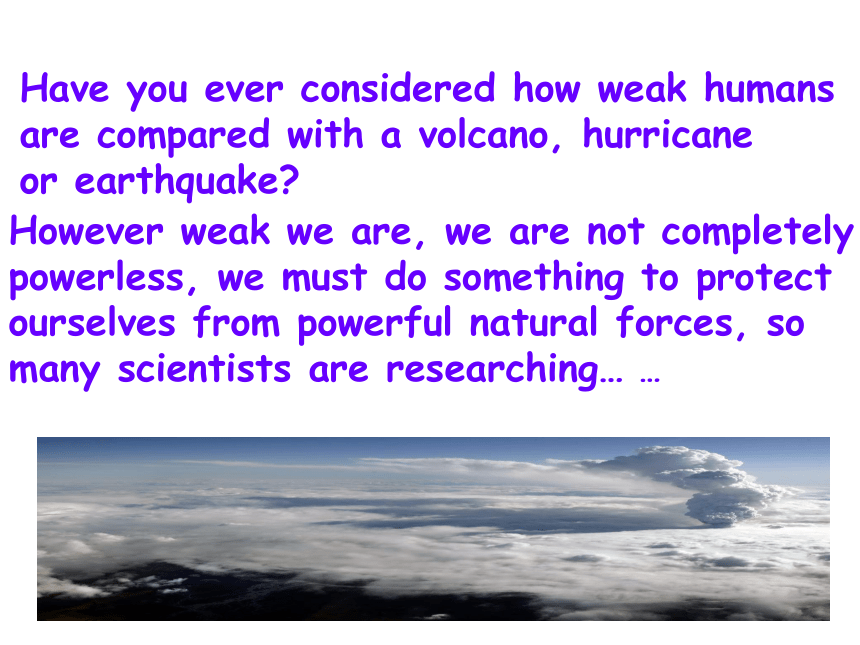
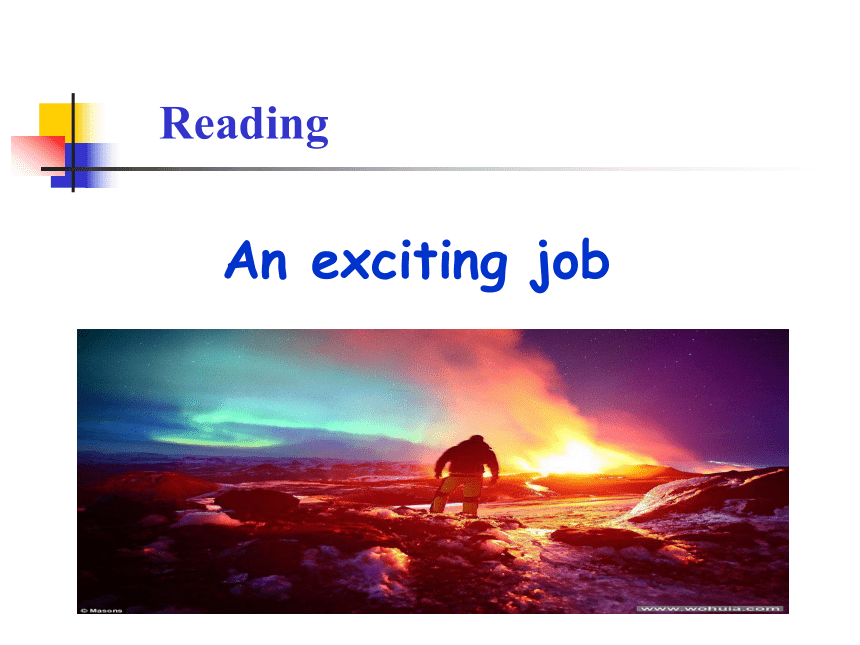
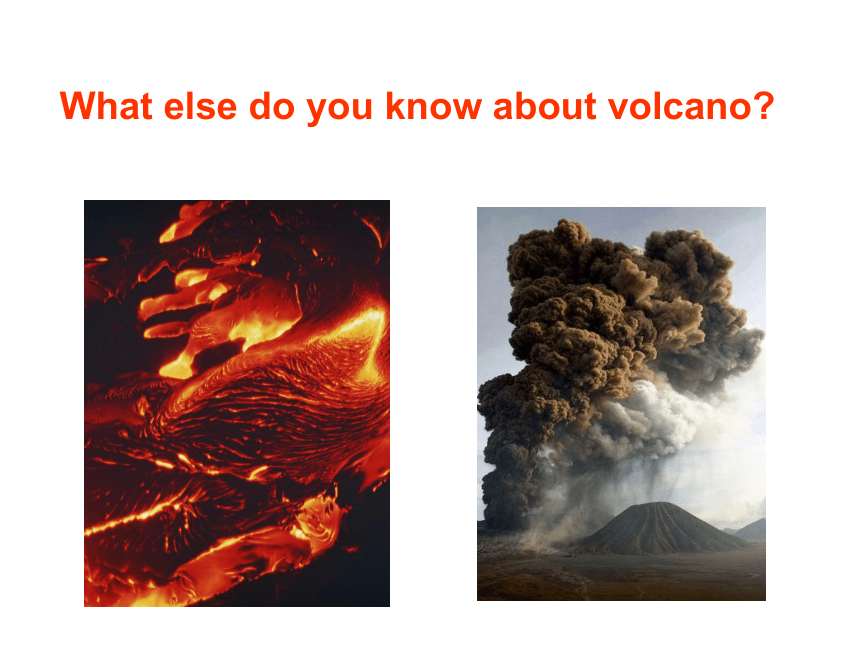
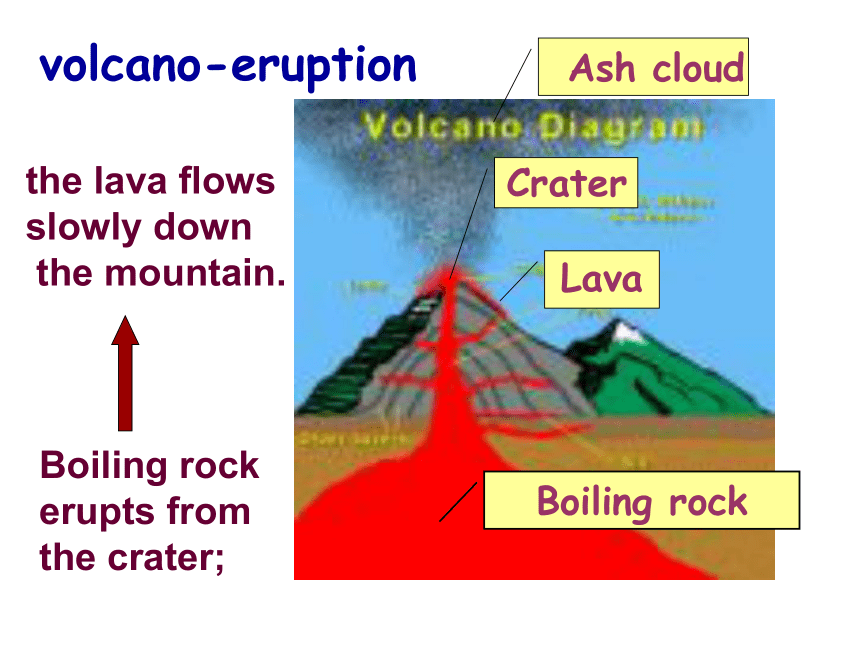
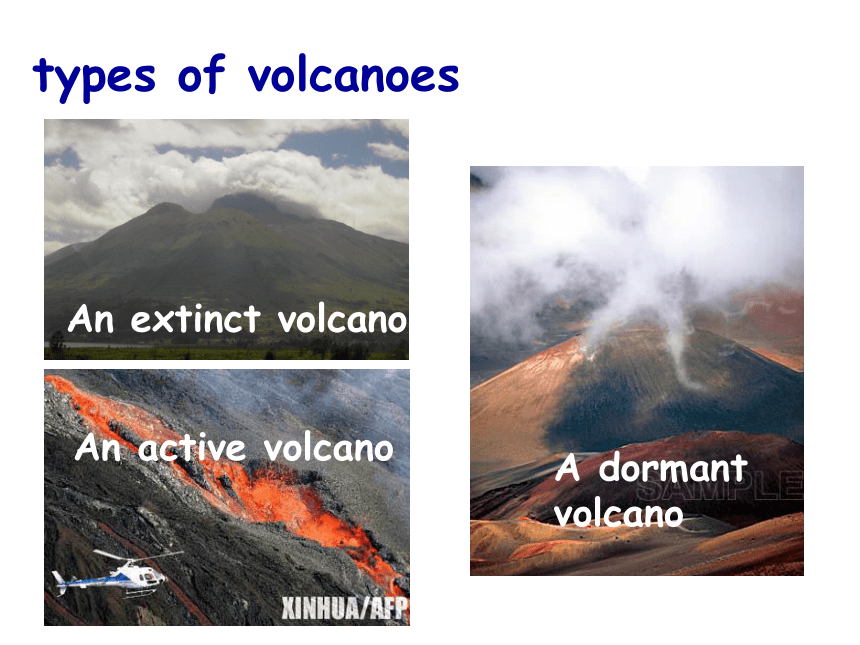
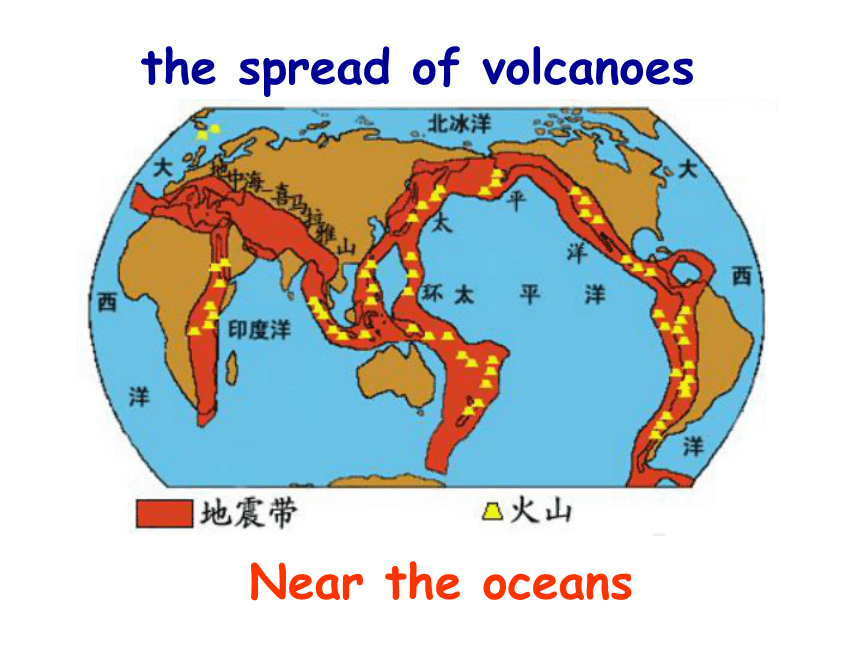
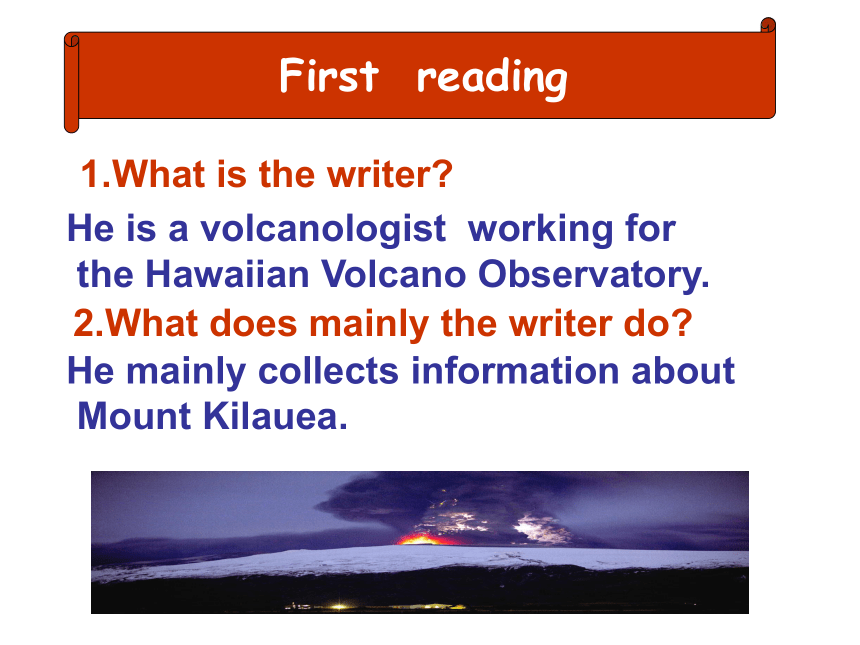
文档简介
(共42张PPT)
Unit 5 The power of nature
Global warming
A rise of sea level
severe storms, floods,
droughts, famines,
the spread of diseases
the disappearance of species.
extreme weather
What could global warming cause
Revision
Can you list some other
natural disasters
natural disasters
sandstorm
typhoon
hurricane
tornado
earthquake
tsunami
debris flow
snowstorm
thunderstorm
volcano
The power of nature
However weak we are, we are not completely powerless, we must do something to protect ourselves from powerful natural forces, so many scientists are researching… …
Have you ever considered how weak humans
are compared with a volcano, hurricane
or earthquake
Reading
An exciting job
What else do you know about volcano
Boiling rock
Lava
Crater
Ash cloud
Boiling rock
erupts from
the crater;
the lava flows
slowly down
the mountain.
volcano-eruption
An extinct volcano
An active volcano
types of volcanoes
A dormant
volcano
Near the oceans
the spread of volcanoes
What is the writer
He is a volcanologist working for
the Hawaiian Volcano Observatory.
2.What does mainly the writer do
He mainly collects information about
Mount Kilauea.
First reading
3. Where is Mount Kilauea
In Hawaii.
4. When did he first see an eruption
It was in the second week
after he arrived in Hawaii.
5. Why was it difficult for the writer to walk towards the edge of the crater
The writer wore special protective suits that made it difficult to walk.
What’s the main idea of the article
The writer expressed his love for his job as a volcanologist and told us his unusual experiences in Mount Kilauea.
Second reading
Part 1
(Para 1-2)
Part 2
(Para 3-4)
Part 3
(Para 5)
The writer’s job and its importance
The writer’s experience of watching
the volcanic eruption
The reasons for the writer’s
enthusiasm about his job
Parts
Main idea of each part
Para. 1
1.The writer doesn't mind the occasional
danger of his job because
______________________________________.
danger excites him and makes him feel alive
2. What does the word “alive” mean
A. Living or not dead. B. Active or lively.
C. Continuing. D. Healthy.
Third reading
3.Translate the last sentence into Chinese.
然而,最重要的是,通过我的工作能保护
普通百姓免遭火山的威胁----这是世界上
最大的自然威力之一。
Para. 2
1.Why is a volcanologist’s job important
Because his job is to predict where lava
will flow and how fast so that the people
in the path of the lava can be warned to
leave their house.
2.Analyze and translate the sentence
Having collected and evaluated the information,
I help other scientists to predict where lava from
the volcano will flow next and how fast.
收集和评估了这些信息之后,我就帮助其他科学家
一起预测下次火山熔岩将往何处流去,流速是多少。
Boiling rock which erupts from the volcano and crashes back to earth causes less damage.
B. The lava that flows slowly down the
mountain causes far more damage.
C. The eruption is much more exciting
to watch.
D. There had been an eruption in the
side of the mountain.
1.What’s the main idea of para.3
Para. 3
2.Why does the writer say that the boiling rock causes less damage while the lava causes far more damage
Less damage
No one lives near the top of the volcano, where the rock falls.
more damage
The flowing lava buries everything
its in path under the molten rock.
3.What caused the writer's bedroom to become as
bright as day even though it was night
The light was caused by the red hot lava that was fountaining hundreds of metres into the air.
my bed began shaking
a strange sound
My bedroom became as bright as day
an abosolutely fantastic sight
red hot lava was fountaining hundreds of metres into the air
4.What made the author realize that an eruption occurred
5.Analyse and translate the sentences:
Having experienced quite a few earthquakes in
Hawaii already, I didn’t take much notice.
因为我在夏威夷曾经经历过多次地震,所以对这种
声音我并不在意。
我刚要再睡,这时突然我的房间亮如白昼。
I was about to go back to sleep when suddenly
my bedroom became as bright as day.
be about to do…when…
正要干…这时…
Para. 4
1. Why did the scientists have to get close to the volcano after it began erupting
To collect some lava for later study.
2. What does the writer mean by using “lucky” in the sentence “I was lucky enough to have a much closer look at it.”
A. He felt much safer on the top while the other two scientists climbed down into the crater.
B. It was his first sight of an eruption.
C. It was the first time for him to watch the crater.
D. Both B and C.
______________________special clothes from
the_____________, we put them on before we went
any closer. All three of us looked like __________.
We had white _________________that ________our
whole body,________, big boots and special gloves.
It was not easy to walk in these suits, but we slowly
________________to the edge of the _______and
__________________the red ,boiling centre.
The other two _______________the crater to______
some lava for__________, but this______________
__________, I stayed at the top and watched them.
Having earlier collected
observatory
spacemen
protective suits
covered
helmets
made our way
crater
looked down into
climbed down into
collect
later study
being my first
experience
3.Fill in the blanks according to the text:
Para. 5
1.What does the writer find impressive even after studying volcanoes for more than twenty years
The author is impressed by the beauty of the eruption as well as its potential to cause great damage.
2. Analyze the writer’s feelings:
Find out the words (para1 and para5) that indicate the writer’s feeling about being a volcanologist.
never bored; excited; alive;
The writer is an adventurous man.
The writer loves his job very much.
3. It’s not easy to be a volcanologist.
4. Love and interest is what it takes to do a job well.
5. Courage…
An
Exciting
job
enthusiastic; amazed
What can we learn from these words
Para 5:
Para 1:
2. Having learnt a little more about the work of a volcanologist, do you think it is an occupation you would enjoy Give your reasons.
3. Discuss what skills you think a volcanologist
should have.
Make a dialogue in your group
Do you think how the author feel about his
own job
Assignment
1.Review the –ing form and finish
exercises 1-2 on page 71.
2.Preview the reading passage
on page 39.
He thinks he has the greatest job in the world.
Danger excites him and makes him feel alive.
He thinks his job can protect people from the volcano.
1.How does the author feel about his job
No, I probably wouldn’t enjoy this job because I would have to live in other countries and also I don’t like being in dangerous situations. Also, I’m not very good at science.
Yes, I’d love to do a job like this because I would enjoy working outside and I think I would enjoy the adventure. It would be exciting to meet people from different countries and I would feel good about
helping people avoid danger.
Essential skills
Degree and/or Doctor’s degree in geology
Interest in Earth science which includes:
Knowledge of volcanoes
Knowledge how magma erupts and how it behaves
Research skills
Skill in analyzing and interpreting research results and other information
Practical skills for performing experiments and operating scientific equipment
Desirable skills
Computer skills
Foreign languages
Practical skills such as:
the ability to read maps
problem-solving skills
planning and organizational skills
communication skills
writing skills, for writing reports and for publications
1 Fred Spears works in a wildlife park looking after wild animals; loves nature and spends his holidays climbing mountains
2 Susan Kelp has studied geology at university; very interested in volcanoes; has visited Mount Etna in Sicily, Italy
3 Charles Wild is a medical doctor; works in a laboratory doing research on disease; loves adventure holidays; wants to analyse volcanic samples
Look at these three people who would like to study volcanoes. Which one would you choose to become a volcanologist Give your reasons.
Fred Spears:
He has the interest but not the qualifications. So he is not a good choice to become a volcanologist.
Susan Kelp:
She has studied geology and has an interest in volcanoes. She has all the necessary qualifications but she does not have practical experience devising experiments and analyzing data.
Charles:
He is a medical doctor with an interest in volcanoes. He has experience of conducting experiments but does not have the specific qualifications needed to become a volcanologist.
So
I would choose Susan Kelp because she has the necessary qualifications and the interest. Although she has not yet conducted experiments she will either have learned the techniques during university course or be able to learn them on – the – job. She seems to be the most suitable
candidate.
Unit 5 The power of nature
Global warming
A rise of sea level
severe storms, floods,
droughts, famines,
the spread of diseases
the disappearance of species.
extreme weather
What could global warming cause
Revision
Can you list some other
natural disasters
natural disasters
sandstorm
typhoon
hurricane
tornado
earthquake
tsunami
debris flow
snowstorm
thunderstorm
volcano
The power of nature
However weak we are, we are not completely powerless, we must do something to protect ourselves from powerful natural forces, so many scientists are researching… …
Have you ever considered how weak humans
are compared with a volcano, hurricane
or earthquake
Reading
An exciting job
What else do you know about volcano
Boiling rock
Lava
Crater
Ash cloud
Boiling rock
erupts from
the crater;
the lava flows
slowly down
the mountain.
volcano-eruption
An extinct volcano
An active volcano
types of volcanoes
A dormant
volcano
Near the oceans
the spread of volcanoes
What is the writer
He is a volcanologist working for
the Hawaiian Volcano Observatory.
2.What does mainly the writer do
He mainly collects information about
Mount Kilauea.
First reading
3. Where is Mount Kilauea
In Hawaii.
4. When did he first see an eruption
It was in the second week
after he arrived in Hawaii.
5. Why was it difficult for the writer to walk towards the edge of the crater
The writer wore special protective suits that made it difficult to walk.
What’s the main idea of the article
The writer expressed his love for his job as a volcanologist and told us his unusual experiences in Mount Kilauea.
Second reading
Part 1
(Para 1-2)
Part 2
(Para 3-4)
Part 3
(Para 5)
The writer’s job and its importance
The writer’s experience of watching
the volcanic eruption
The reasons for the writer’s
enthusiasm about his job
Parts
Main idea of each part
Para. 1
1.The writer doesn't mind the occasional
danger of his job because
______________________________________.
danger excites him and makes him feel alive
2. What does the word “alive” mean
A. Living or not dead. B. Active or lively.
C. Continuing. D. Healthy.
Third reading
3.Translate the last sentence into Chinese.
然而,最重要的是,通过我的工作能保护
普通百姓免遭火山的威胁----这是世界上
最大的自然威力之一。
Para. 2
1.Why is a volcanologist’s job important
Because his job is to predict where lava
will flow and how fast so that the people
in the path of the lava can be warned to
leave their house.
2.Analyze and translate the sentence
Having collected and evaluated the information,
I help other scientists to predict where lava from
the volcano will flow next and how fast.
收集和评估了这些信息之后,我就帮助其他科学家
一起预测下次火山熔岩将往何处流去,流速是多少。
Boiling rock which erupts from the volcano and crashes back to earth causes less damage.
B. The lava that flows slowly down the
mountain causes far more damage.
C. The eruption is much more exciting
to watch.
D. There had been an eruption in the
side of the mountain.
1.What’s the main idea of para.3
Para. 3
2.Why does the writer say that the boiling rock causes less damage while the lava causes far more damage
Less damage
No one lives near the top of the volcano, where the rock falls.
more damage
The flowing lava buries everything
its in path under the molten rock.
3.What caused the writer's bedroom to become as
bright as day even though it was night
The light was caused by the red hot lava that was fountaining hundreds of metres into the air.
my bed began shaking
a strange sound
My bedroom became as bright as day
an abosolutely fantastic sight
red hot lava was fountaining hundreds of metres into the air
4.What made the author realize that an eruption occurred
5.Analyse and translate the sentences:
Having experienced quite a few earthquakes in
Hawaii already, I didn’t take much notice.
因为我在夏威夷曾经经历过多次地震,所以对这种
声音我并不在意。
我刚要再睡,这时突然我的房间亮如白昼。
I was about to go back to sleep when suddenly
my bedroom became as bright as day.
be about to do…when…
正要干…这时…
Para. 4
1. Why did the scientists have to get close to the volcano after it began erupting
To collect some lava for later study.
2. What does the writer mean by using “lucky” in the sentence “I was lucky enough to have a much closer look at it.”
A. He felt much safer on the top while the other two scientists climbed down into the crater.
B. It was his first sight of an eruption.
C. It was the first time for him to watch the crater.
D. Both B and C.
______________________special clothes from
the_____________, we put them on before we went
any closer. All three of us looked like __________.
We had white _________________that ________our
whole body,________, big boots and special gloves.
It was not easy to walk in these suits, but we slowly
________________to the edge of the _______and
__________________the red ,boiling centre.
The other two _______________the crater to______
some lava for__________, but this______________
__________, I stayed at the top and watched them.
Having earlier collected
observatory
spacemen
protective suits
covered
helmets
made our way
crater
looked down into
climbed down into
collect
later study
being my first
experience
3.Fill in the blanks according to the text:
Para. 5
1.What does the writer find impressive even after studying volcanoes for more than twenty years
The author is impressed by the beauty of the eruption as well as its potential to cause great damage.
2. Analyze the writer’s feelings:
Find out the words (para1 and para5) that indicate the writer’s feeling about being a volcanologist.
never bored; excited; alive;
The writer is an adventurous man.
The writer loves his job very much.
3. It’s not easy to be a volcanologist.
4. Love and interest is what it takes to do a job well.
5. Courage…
An
Exciting
job
enthusiastic; amazed
What can we learn from these words
Para 5:
Para 1:
2. Having learnt a little more about the work of a volcanologist, do you think it is an occupation you would enjoy Give your reasons.
3. Discuss what skills you think a volcanologist
should have.
Make a dialogue in your group
Do you think how the author feel about his
own job
Assignment
1.Review the –ing form and finish
exercises 1-2 on page 71.
2.Preview the reading passage
on page 39.
He thinks he has the greatest job in the world.
Danger excites him and makes him feel alive.
He thinks his job can protect people from the volcano.
1.How does the author feel about his job
No, I probably wouldn’t enjoy this job because I would have to live in other countries and also I don’t like being in dangerous situations. Also, I’m not very good at science.
Yes, I’d love to do a job like this because I would enjoy working outside and I think I would enjoy the adventure. It would be exciting to meet people from different countries and I would feel good about
helping people avoid danger.
Essential skills
Degree and/or Doctor’s degree in geology
Interest in Earth science which includes:
Knowledge of volcanoes
Knowledge how magma erupts and how it behaves
Research skills
Skill in analyzing and interpreting research results and other information
Practical skills for performing experiments and operating scientific equipment
Desirable skills
Computer skills
Foreign languages
Practical skills such as:
the ability to read maps
problem-solving skills
planning and organizational skills
communication skills
writing skills, for writing reports and for publications
1 Fred Spears works in a wildlife park looking after wild animals; loves nature and spends his holidays climbing mountains
2 Susan Kelp has studied geology at university; very interested in volcanoes; has visited Mount Etna in Sicily, Italy
3 Charles Wild is a medical doctor; works in a laboratory doing research on disease; loves adventure holidays; wants to analyse volcanic samples
Look at these three people who would like to study volcanoes. Which one would you choose to become a volcanologist Give your reasons.
Fred Spears:
He has the interest but not the qualifications. So he is not a good choice to become a volcanologist.
Susan Kelp:
She has studied geology and has an interest in volcanoes. She has all the necessary qualifications but she does not have practical experience devising experiments and analyzing data.
Charles:
He is a medical doctor with an interest in volcanoes. He has experience of conducting experiments but does not have the specific qualifications needed to become a volcanologist.
So
I would choose Susan Kelp because she has the necessary qualifications and the interest. Although she has not yet conducted experiments she will either have learned the techniques during university course or be able to learn them on – the – job. She seems to be the most suitable
candidate.
